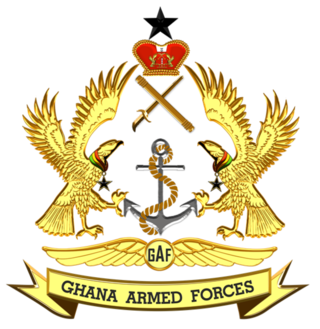
The Ghana Armed Forces (GAF) is the unified armed force of Ghana, consisting of the Army (GA), Navy (GN), and Ghana Air Force.
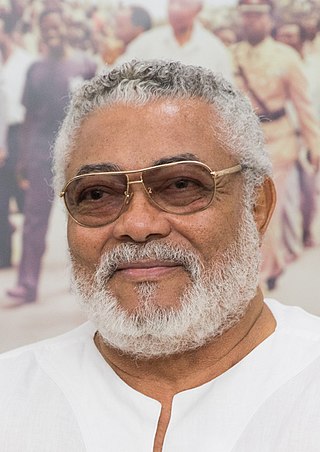
Jerry John Rawlings was a Ghanaian military officer, aviator and politician who led the country for a brief period in 1979, and then from 1981 to 2001. He led a military junta until 1992, and then served two terms as the democratically elected president of Ghana.
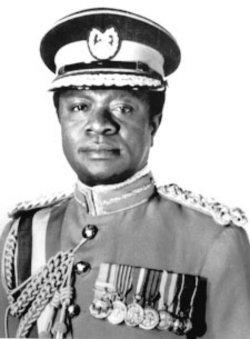
Ignatius Kutu Acheampong was a Ghanaian military officer and politician who was the military head of state of Ghana from 13 January 1972 to 5 July 1978, when he was deposed in a palace coup. He was executed by firing squad on 16 June 1979.
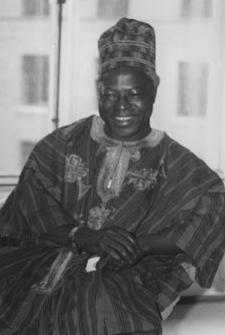
Hilla Limann, was a Ghanaian diplomat and politician who served the President of Ghana from 24 September 1979 to 31 December 1981. He served as a diplomat in Lomé, Togo and Geneva, Switzerland.
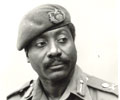
Lieutenant General Frederick William "Fred" Kwasi Akuffo was a Ghanaian soldier and politician. He was Chief of the Defence Staff of the Ghana Armed Forces from 1976 to 1978, and chairman of the ruling Supreme Military Council in Ghana from 1978 to 1979. He became leader of the government in a palace coup against General Kutu Acheampong, and was overthrown and executed in another military coup less than a year later.

The Supreme Military Council (SMC) was the ruling government of Ghana from 9 October 1975 to 4 June 1979. Its chairman was Colonel I.K. Acheampong. He was also the Head of state of Ghana due to his chairmanship.

The Armed Forces Revolutionary Council (AFRC) was the military Junta that seized power in Ghana from June 4, 1979, to September 24, 1979.
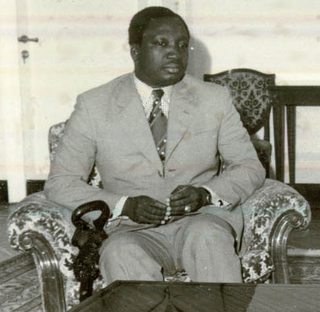
Colonel Roger Joseph Atogetipoli Felli was a soldier and politician who was once the foreign minister of Ghana.
Major General Robert Ebenezer Abossey Kotei was a soldier, politician and track and field athlete. He was once the Chief of Defence Staff of the Ghana Armed Forces and also a member of the Supreme Military Council that ruled Ghana between 1975 and 1979. He was executed in 1979, following a military coup. He also held the Ghanaian high jump record for many years.

A referendum on the system of government was held in Ghana on 30 March 1978.
Major Kojo Boakye-Djan was a Ghanaian military officer and coup plotter. He is known to have planned the coup that brought Flight Lieutenant Jerry John Rawlings to power in Ghana on 4 June 1979 with other junior officers.

The mass media in Ghana, includes television, radio, internet publishing and newspapers.
Major General Neville Alexander Odartey-Wellington (1934–1979) was a Ghanaian army officer who was Chief of Army Staff of the Ghana Army from 1978 to 1979. He died in action leading loyal troops against revolting forces during the 4 June 1979 military uprising in Ghana which toppled the Supreme Military Council II government led by Fred Akuffo.
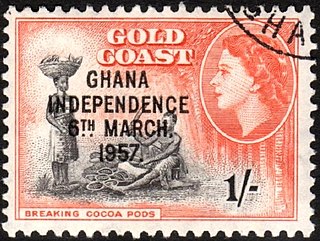
Ghana gained independence from the British on 6 March 1957. It is a member of the Commonwealth of Nations. The country became a republic on July 1, 1960.
1970s in Ghana details events of note that happened in Ghana in the years 1970 to 1979.

Henry Romulus Sawyerr, was a Ghanaian politician and surveyor. He was Minister for Education from 1993 to 1997 in Jerry Rawlings' first presidential term of office, under the Fourth Republic. In the Second Republic, Sawyerr was Member of Parliament (MP) for Osu-Klottey as a non-party candidate. In the Third Republic, he was again elected MP but gave up the seat to be in Hilla Limann's cabinet as Minister for Transport and Communications from 1979 to 1981.
Peter Tasiri Azongo is a Ghanaian soldier and politician. He was a member of the Armed Forces Revolutionary Council (AFRC) which ruled Ghana for a few months in 1979.

The Political history of Ghana recounts the history of varying political systems that existed in Ghana during pre-colonial times, the colonial era and after independence. Pre-colonial Ghana was made up of several states and ethnic groups whose political system was categorized by 3 main administrative models; Centralized, Non-centralized and Theocratic states. In the colonial era, the British Empire employed different forms of government among its four territorial possessions in the Gold Coast. Indirect rule was implemented in the late 19th century after its success in Northern Nigeria. From the 1940s, native Ghanaians yearned for more autonomy. This resulted in the several constitutional reforms as well as the creation of the office of the Prime Minister in 1952.
Joseph Kwame Adjei Buadi was a Ghanaian soldier and politician. He was one of the original members of the Provisional National Defence Council (PNDC) military government which came to power following the overthrow of the Limann government on 31 December 1981.









